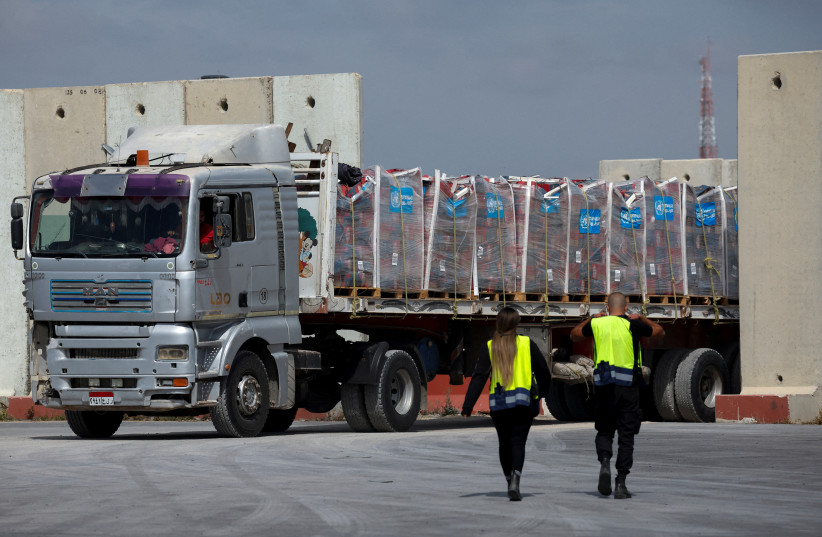US warned Israel will be judged on results of Gaza aid decisions
The United States warned that Israel would be judged on the results of the security cabinet’s decision late Thursday night to increase the flow of humanitarian assistance to Gaza, including opening the Erez crossing and allowing goods to move through the Ashdod Port.
“These are positive developments,” US Secretary of State Antony Blinken said on Friday, “but the real test is results, and that’s what we’re looking to see in the coming days and the coming weeks.”
He laid a series of litmus tests by which the Biden administration would judge the effectiveness of the security cabinet’s decisions.
“Is the aid effectively reaching people who need it throughout Gaza? Are the bottlenecks and other delays at crossings being resolved? Do we have a much better system for deconfliction and coordination so that the humanitarian workers, the folks who are delivering the aid, can do it safely and securely?” he stated as he spoke to reporters in Belgium.
The US will also look at the number of trucks that are entering Gaza on a sustained basis, Blinken said.

Almost “100 percent of the population is acutely food insecure,” Blinken explained, adding that “there are indicators of potential famine,” so the US will “be looking closely at those to see that they’re reversed.”
Israel, he stressed, must also do a better job at protecting Palestinian civilians.
“As Israel pursues any military operations against Hamas, it has to prioritize the protection of civilians. It has to make that job number one… Military operations need to be designed around their protection, not the other way around.”
He spoke in the aftermath of a stern phone call US President Joe Biden held with Prime Minister Benjamin Netanyahu on Thursday night following last week’s accidental IDF killing in Gaza of seven aid workers from the World Central Kitchen.
The IDF released the result of an initial probe into the incident on Friday and fired two officers. The White House said it had no plans to conduct an independent investigation.
Authorized increased aid
The Prime Minister’s Office said late Thursday night that the security cabinet had authorized Netanyahu, Defense Minister Yoav Gallant, and Minister without Portfolio Benny Gantz “to take immediate steps to increase humanitarian aid to the civilian population in the Gaza Strip.”
“This increased aid will prevent a humanitarian crisis and is necessary to ensure the continuation of the fighting and to achieve the goals of the war,” the office said.
To help facilitate the delivery of the aid, Israel will temporarily allow goods for Gaza to land at the port in Ashdod, a step that had been halted after the Hamas-led attack on October 7.
Israel also plans to temporarily open the Erez crossing located next to northern Gaza and close to Ashdod for the entry of humanitarian assistance.
More Jordanian aid will enter Gaza through the Kerem Shalom border crossing, the PMO stated.
At the cabinet meeting, Foreign Minister Israel Katz supported the increase in humanitarian aid in light of the urgent diplomatic need for Israel to take action on the matter.
He opposed, however, to the use of the Ashdod Port in order to transport goods into Gaza, since this contradicts his belief that, in the aftermath of the war, the connection between Israel and the enclave must be severed.
Until the war, the Kerem Shalom crossing between Israel and Gaza had been the main corridor through which goods entered the enclave.
Katz is among those Israeli politicians who believe that the Hamas-led attack on October 7 in which over 1,200 people were killed, makes it impossible to return to that arrangement.
He fears that returning to a system by which goods arrive in Ashdod and then are transported by land to Gaza could suggest a return to an apparatus whereby Israel becomes responsible for delivering aid to Gaza.
After the meeting, Katz continued to do damage control with Israeli allies, including those from countries whose citizens were among the seven aid workers killed: the United Kingdom, Australia, Canada, and Poland.
He also spoke with the foreign ministers from Japan and the United Arab Emirates.
Among the issues he discussed were the IDF’s investigation into the deaths of the WCK aid workers and the increase in humanitarian aid.
Reuters contributed to this report.





Comments are closed.